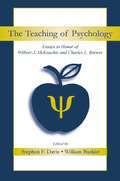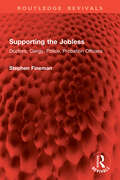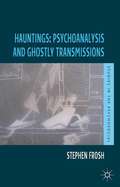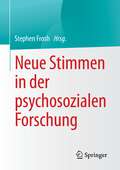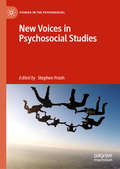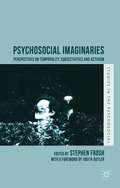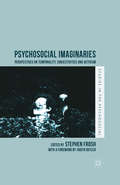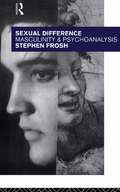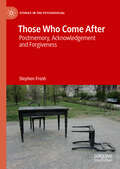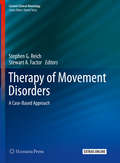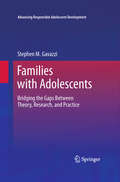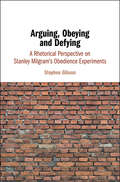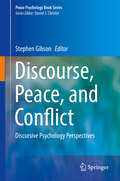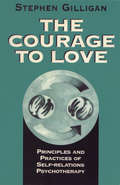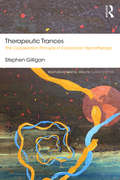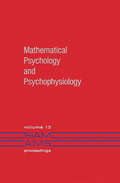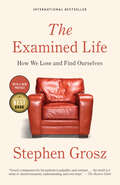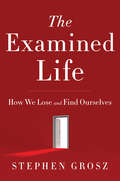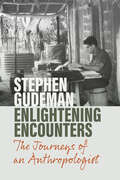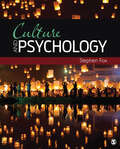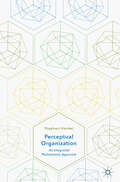- Table View
- List View
The Teaching of Psychology: Essays in Honor of Wilbert J. McKeachie and Charles L. Brewer
by Stephen F. Davis William BuskistThe Teaching of Psychology is centered around the masterful work of two champions of the teaching of psychology, Wilbert J. McKeachie and Charles L. Brewer, in order to recognize their seminal contributions to the teaching of the discipline. The book's main goal is to provide comprehensive coverage and analysis of the basic philosophies, current issues, and the basic skills related to effective teaching in psychology. It transcends the typical "nuts and bolts" type books and includes such topics as teaching at small colleges versus a major university, teaching and course portfolios, the scholarship of teaching, what to expect early in a teaching career, and lifelong learning.The Teaching of Psychology also features: Biographies of Bill McKeachie and Charles L. Brewer Fourteen chapters written by leading authorities in the teaching of psychology, which provide overviews of the latest psychological research and theories in effective college and university teaching. These chapters cover lecturing, classroom presence, using humor in teaching, pedagogy, advising, teaching critical thinking, writing, and technology, and training graduate students to teach Useful advice to new teachers and seasoned veterans, including qualities of master teachers, understanding the many facets of working within the academy, and teaching with technology Insights into teaching specific courses within the psychology curriculum, including the history of psychology, biological psychology, statistics and research methods, learning, social psychology, personality, psychology of women, cross-cultural psychology, industrial/organizational psychology, psychology of religion, and environmental psychology A closing section containing Bill McKeachie's and Charles L. Brewer's perspectives into the teaching of psychology and its history, highlights, and future. This book is intended for academic psychologists who teach and/or train graduate assistants to teach at the college and university level. All royalities from this book will be donated to the Society for the Teaching of Psychology (Division 2 of the American Psychological Association), which each year sponsors many activities across the country to promote the teaching of psychology.
Supporting the Jobless: Doctors, Clergy, Police, Probation Officers (Routledge Revivals)
by Stephen FinemanThe problems of unemployment soon reach the desks and consulting rooms of professional helpers. But, when joblessness is the ‘social disease’, what role is there for the professional who sees the symptoms but cannot offer the cure—a job? Stephen Fineman in his book Supporting the Jobless (first published in 1990) reveals, through a sensitive portrait of their lives and dilemmas, the sense of crisis that these professionals feel in the face of unemployment.The book covers four professions—medicine, specifically general practice; the clergy; the police; and the probation service. They represent the spectrum of social care provision and very different professional and organizational cultures. The author looks closely at how helpers respond to their jobless clients. Some cling to vestiges of their traditional professionalism, while others try to develop more effective support, only to encounter rigid professional restraints intent on self-protection. The author considers whether professionals are flexible enough to overcome these restraints and change their practice and organization to respond to their clients’ needs.This volume is a practical and accessible study of the human cost of unemployment from the professionals’ viewpoint. Based on detailed research and case studies, it offers unusual accounts of joblessness to students of sociology, social psychology, and management. It gives professionals constructive suggestions for improving the service they offer clients who find themselves out of work.
Social Psychology (Sixth Edition)
by Stephen FranzoiLearn more about group psychology and dynamics.
For and Against Psychoanalysis
by Stephen FroshPsychoanalysis has always been a source of controversy throughout academic and popular culture. This controversy relates to questions of its true value, its scientific status, its politics and its therapeutic effectiveness. Psychoanalysis' defenders regard it as a body of knowledge built on careful and painstaking exploration of complex clinical encounters, offering more detailed and valid insights than can be obtained from other sources. Psychoanalysis is also a building block for considerations of human subjectivity in a wide range of academic disciplines and practical areas of work, from social theory to feminist studies, to counselling and psychotherapy. In this thoroughly revised and updated second edition of For and Against Psychoanalysis, Stephen Frosh examines the arguments surrounding psychoanalysis at some key points: its standing as a scientific theory, its value as a method of therapy, its potency as a contributor to debates around identity construction, gender, homosexuality and racism. At each of these points, there is something to be said 'for and against' psychoanalysis, with the balance depending on whether it deepens our understanding of human functioning, whether it is consistent with its own perceptions and theories or seems subservient to social pressures and norms, and whether it is coherent or muddled, evocative or sterile. For and Against Psychoanalysis provides an accessible introduction and critical guide to the current standing of psychoanalysis. It is essential reading for students of psychoanalysis, counselling, psychotherapy and psychology, and for social researchers and social theorists, as well as for those who are simply interested in what place psychoanalysis has in the modern world.
Hauntings: Psychoanalysis and Ghostly Transmissions
by Stephen FroshThis book explores how the present is troubled by the past and the future. It uses the idea of haunting to explore how identities, beliefs, intimacies and hatreds are transmitted across generations and between people and how these things structure psychosocial and psychopolitical life.
Neue Stimmen in der psychosozialen Forschung
by Stephen FroshDie psychosozialen Studien im Vereinigten Königreich sind ein vielfältiger Arbeitsbereich, der sich durch Innovation in Theorie und empirischer Forschung auszeichnet. Die außerordentliche Lebendigkeit dieses Bereichs zeigt sich in diesem Buch, das die Forschungsarbeiten der Abteilung für psychosoziale Studien an der Birkbeck University of London, UK, vorstellt und drei zentrale Bereiche der Disziplin beleuchtet: Psychoanalyse, Ethik und Reflexivität sowie Widerstand. Das Buch befasst sich auf psychosoziale Weise mit einer Vielzahl von Themen, von der Sozialkritik der Psychoanalyse über postkoloniale und Queer-Theorie bis hin zu Studien über psychische Gesundheit und Widerstand gegen Diskriminierung. Diese "New Voices in Psychosocial Studies" bieten eine kohärente und doch weitreichende Darstellung der Forschung, die in einem "Dialekt" des neuen Terrains der psychosozialen Studien stattgefunden hat, und ein Agenda-setzendes Manifest für einige der Arten von Arbeit, die die fortgesetzte Kreativität der psychosozialen Studien in der nächsten Generation sicherstellen könnten. Dieses Buch zeigt die kontinuierliche Entwicklung der psychosozialen Studien als innovative, kritische Kraft und wird sowohl neue als auch etablierte Forscher aus allen Bereichen inspirieren, die ihren transdisziplinären Ansatz beeinflussen, einschließlich: kritische Psychologie und radikale Soziologie, feministische, queere und postkoloniale Theorie, kritische Anthropologie und Ethnographie und Phänomenologie.
New Voices in Psychosocial Studies (Studies in the Psychosocial)
by Stephen FroshPsychosocial studies in the UK is a diverse area of work characterised by innovation in theory and empirical research. Its extraordinary liveliness is demonstrated in this book, which showcases research undertaken at the Department of Psychosocial Studies at Birkbeck, University of London, UK, highlighting three domains central to the discipline – psychoanalysis, ethics and reflexivity, and resistance. The book engages psychosocially with a wide variety of topics, from social critiques of psychoanalysis through postcolonial and queer theory to studies of mental health and resistance to discrimination. These ‘New Voices in Psychosocial Studies’ offer a coherent yet wide-ranging account of research that has taken place in one ‘dialect’ of the new terrain of psychosocial studies and an agenda-setting manifesto for some of the kinds of work that might ensure the continued creativity of psychosocial studies into the next generation. This book demonstrates the ongoing development of psychosocial studies as an innovative, critical force and will inspire both new and established researchers from across the fields that influence its transdisciplinary approach, including: critical psychology and radical sociology, feminist, queer and postcolonial theory, critical anthropology and ethnography and phenomenology.
Psychosocial Imaginaries: Perspectives on Temporality, Subjectivities and Activism (Studies in the Psychosocial)
by Stephen FroshPsychosocial Imaginaries.
Psychosocial Imaginaries: Perspectives on Temporality, Subjectivities and Activism (Studies in the Psychosocial)
by Stephen FroshPsychosocial studies challenges the traditions of psychology and sociology from a genuinely transdisciplinary perspective. The book reflects this agenda in its varied theoretical and empirical strands, producing a newly contextualised and restless body of understanding of how 'psychic' and 'social' processes intertwine.
Sexual Difference: Masculinity and Psychoanalysis
by Stephen FroshSexual Difference is a critical exploration of psychoanalytic theories of sexual difference. In particular it explores the way in which masculinity is expressed in theory and practice. Developing from the unsettling impact of these issues on the author's own professional practice, Stephen Frosh examines how the very language and structure of psychoanalysis are loaded with assumptions about gender. Employing both Kleinian and Lacanian theoretical perspectives this book critically examines these approacheds to sexial difference. In addition, it discusses the application of these issues in the practice of treating sexual violence and in cases of child secual abuse. Sexual Difference will be of value to all trainees and professionals in psychotherapy, psychoanalysis, psychology and social work, as well as all those with an interest in `masculinity', `femininity' and their effects.
Those Who Come After: Postmemory, Acknowledgement and Forgiveness (Studies in the Psychosocial)
by Stephen FroshThis book explores the legacies of suffering in relation to ‘those who come after’ – the descendants of victims, survivors and perpetrators of traumatic events. It draws on recent discussions of ‘postmemory’ and ‘haunting’ that are concerned mainly with the transgenerational impact of personal and social trauma. It examines how we are connected to past events for which we have no direct responsibility yet in which we might in some way be ‘implicated’ and it asks how we might attain a position of active witnessing that helps resolve the suffering of others. Those Who Come After includes vivid accounts of witnessing from a variety of perspectives, ranging from Biblical and Jewish stories to contemporary art and music. The book draws on psychosocial studies and psychoanalysis to help make sense of this material and to develop an understanding of acknowledgment and responsibility that is both ethical and emancipatory. Those Who Come After will be of great interest to readers in psychosocial studies and psychoanalysis and to all who are concerned with the question of how to put past suffering to rest.
Therapy of Movement Disorders: A Case-Based Approach (Current Clinical Neurology)
by Stephen G. Reich Stewart A. FactorThis case-based text provides treatment approaches to common and uncommon movement disorders. The first two parts of the book are devoted to the wide spectrum of motor and non-motor problems encountered in caring for people with Parkinson’s disease, as well as Parkinsonian syndromes. Next are parts with chapters addressing essential and other tremor disorders followed by management of the various dystonic syndromes and other hyperkinetic disorders including chorea, tics, and myoclonus. Other disorders covered are drug-induced movement disorders, psychogenic movement disorders, Wilson’s disease, hemifacial spasm and more. Authored by experts globally, this practical guide will help physicians, other healthcare professionals and trainees care for patients with a wide spectrum of movement disorder related problems.
Families with Adolescents
by Stephen GavazziThis book focuses a unique panoramic lens on the study of adolescent development. It offers a clear blueprint for more consistently improved practice, emphasizing family process and structure instead of individual developmental stages.
Arguing, Obeying and Defying: A Rhetorical Perspective on Stanley Milgram's Obedience Experiments
by Stephen GibsonStanley Milgram's obedience experiments are among the most influential and controversial scientific studies ever conducted. The experiments are commonly understood to have shown how easily people can be led into harming another person, simply as a result of following orders. Recently, however, Milgram's studies have been subjected to a sustained critique and re-evaluation. This book draws on the vast stock of audio recordings from Milgram's experiments to reveal how these experiments can be understood as occasions for argumentation and rhetoric, rather than showing how passive subjects can be led into simply doing as they are told. In doing so, it reconsiders what we understand by 'obedience' and extends how social psychologists have understood rhetoric itself.
Discourse, Peace, and Conflict: Discursive Psychology Perspectives (Peace Psychology Book Series)
by Stephen GibsonThis first-of-its-kind volume brings discursive psychology and peace psychology together in a compelling practical synthesis. An array of internationally-recognised contributors examine multiple dimensions of discourse—official and casual, speech, rhetoric, and text—in creating and maintaining conflict and building mediation and reconciliation. Examples of strategies for dealing with longstanding conflicts (the Middle East), significant flashpoints (the Charlie Hebdo case), and current heated disputes (the refugee ‘crisis’ in Europe) demonstrate discursive methods in context as they bridge theory with real life. This diversity of subject matter is matched by the range of discursive approaches applied to peace psychology concepts, methods, and practice.Among the topics covered: Discursive approaches to violence against women.The American gun control debate: a discursive analysis.Constructing peace and violence in the Palestinian-Israeli conflict.Discursive psychological research on refugees. Citizenship, social injustice, and the quest for a critical social psychology of peace.The emotional and political power of images of suffering: discursive psychology and the study of visual rhetoric. Discourse, Peace, and Conflict offers expansive ideas to scholars and practitioners in peace psychology, as well as those in related areas such as social psychology, political psychology, and community psychology with an interest in issues pertaining to peace and conflict.
The Courage to Love: Principles and Practices of Self-Relations Psychotherapy
by Stephen Gilligan<P> This is a book about how psychotherapy may be used to cultivate the courage and freedom to love. <P> In a time when love seems to be fading and hatred and despair rising, it presents love as a skill and force that can heal and invigorate, reconnect and guide, calm and encourage. In Gilligan's self-relations approach, psychotherapy is a conversation about competing differences. When these differences are treated violently or indifferently, problems arise; solutions develop when the skills of love are practiced. Those practical skills are described here, with an emphasis on postconventional ethics, Buddhist and aikido principles, and ideas of human sponsorship.
Therapeutic Trances: The Cooperation Principle in Ericksonian Hypnotherapy (Routledge Mental Health Classic Editions)
by Stephen GilliganTherapeutic Trances is a manifesto of the fundamental principles and techniques of Ericksonian hypnotherapy. This innovative volume lays out the principles and practice of developing relationships with patients and creating a hypnotic environment in which true healing can take place. The book offers therapists specific questions to ask and practical ideas to pursue, thereby illustrating how therapists may cooperate with clients to translate problems into solutions. Stephen Gilligan synthesizes the approaches of Erickson, Bandler & Grinder, and Bateson to bring a new perspective to the field.
Mathematical Psychology and Psychophysiology (Siam-ams Proceedings Ser. #13)
by Stephen GrossbergMathematical Psychology and Psychophysiology promotes an understanding of the mind and its neural substrates by applying interdisciplinary approaches to issues concerning behavior and the brain. The contributions present model from many disciplines that share common, conceptual, functional, or mechanistic substrates and summarize recent models and data from neural networks, mathematical genetics, psychoacoustics, olfactory coding, visual perception, measurement, psychophysics, cognitive development, and other areas. The contributors to Mathematical Psychology and Psychophysiology show the conceptual and mathematical interconnectedness of several approaches to the fundamental scientific problem of understanding mind and brain. The book's interdisciplinary approach permits a deeper understanding of theoretical advances as it formally structures a broad overview of the data.
The Examined Life
by Stephen GroszThe everyday world bedevils us. To make sense of it, we tell ourselves stories. Here, in short, vivid, dramatic tales, psychoanalyst Stephen Grosz draws from his twenty-year practice to track the collaborative journey of therapist and patient as they uncover the hidden feelings behind ordinary behavior. A woman finds herself daydreaming as she returns home from a business trip; a young man loses his wallet. We learn, too, from more extreme examples: the patient who points an unloaded gun at a police officer, the compulsive liar who convinces his wife he's dying of cancer. These beautifully rendered tales illuminate the fundamental pathways of life from birth to death. They invite compassionate understanding, suggesting answers to the questions that compel and disturb us most about love and loss, parents and children, work and change. The resulting journey will spark new ideas about who we are and why we do what we do.
The Examined Life: How We Lose and Find Ourselves
by Stephen GroszAn extraordinary book for anyone eager to understand the hidden motives that shape our lives. We are all storytellers--we create stories to make sense of our lives. But it is not enough to tell tales. There must be someone to listen. In his work as a practicing psychoanalyst, Stephen Grosz has spent the last twenty-five years uncovering the hidden feelings behind our most baffling behavior. The Examined Life distils more than 50,000 hours of conversation into pure psychological insight without the jargon. This extraordinary book is about one ordinary process: talking, listening, and understanding. Its aphoristic and elegant stories teach us a new kind of attentiveness. They also unveil a delicate self-portrait of the analyst at work and show how lessons learned in the consulting room can reveal as much to the analyst as to the patient. These are stories about our everyday lives: they are about the people we love and the lies we tell, the changes we bear and the grief. Ultimately, they show us not only how we lose ourselves but also how we might find ourselves.
The Examined Life: How We Lose and Find Ourselves
by Stephen GroszThe everyday world bedevils us. To make sense of it, we tell ourselves stories. Here, in short, vivid, dramatic tales, psychoanalyst Stephen Grosz draws from his twenty-year practice to track the collaborative journey of therapist and patient as they uncover the hidden feelings behind ordinary behavior. A woman finds herself daydreaming as she returns home from a business trip; a young man loses his wallet. We learn, too, from more extreme examples: the patient who points an unloaded gun at a police officer, the compulsive liar who convinces his wife he's dying of cancer. These beautifully rendered tales illuminate the fundamental pathways of life from birth to death. They invite compassionate understanding, suggesting answers to the questions that compel and disturb us most about love and loss, parents and children, work and change. The resulting journey will spark new ideas about who we are and why we do what we do.
Enlightening Encounters: The Journeys of an Anthropologist
by Stephen GudemanOne of the world's top anthropologists recounts his formative experiences doing fieldwork in this accessible memoir ideal for anyone interested in anthropology. Drawing on his research in five Latin American countries, Steve Gudeman describes his anthropological fieldwork, bringing to life the excitement of gaining an understanding of the practices and ideas of others as well as the frustrations. He weaves into the text some of his findings as well as reflections on his own background that led to better fieldwork but also led him astray. This readable account, shorn of technical words, complicated concepts, and abstract ideas shows the reader what it is to be an anthropologist enquiring and responding to the unexpected. From the Preface: Growing up I learned about making do when my family was putting together a dinner from leftovers or I was constructing something with my father. In fieldwork I saw people making do as they worked in the fields, repaired a tool, assembled a meal or made something for sale. Much later, I realized that making do captures some of my fieldwork practices and their presentation in this book.
Culture and Psychology
by Stephen H. FoxUsing an engaging storytelling approach, Culture and Psychology introduces students to culture from a scientific yet accessible point of view. Author Stephen Fox integrates art, literature, and music into each chapter to offer students a rich and complete picture of cultures from around the world. The text wholly captures students’ attention while addressing key concepts typically found in a Psychology of Culture or Cross-Cultural Psychology course. Chapters feature personalized, interdisciplinary stories to help students understand specific concepts and theories, and encourage them to make connections between the material and their own lives.
Culture and Psychology
by Stephen H. FoxUsing an engaging storytelling approach, Culture and Psychology introduces students to culture from a scientific yet accessible point of view. Author Stephen Fox integrates art, literature, and music into each chapter to offer students a rich and complete picture of cultures from around the world. The text wholly captures students’ attention while addressing key concepts typically found in a Psychology of Culture or Cross-Cultural Psychology course. Chapters feature personalized, interdisciplinary stories to help students understand specific concepts and theories, and encourage them to make connections between the material and their own lives.
Perceptual Organization: An Integrated Multisensory Approach
by Stephen HandelThis textbook goes beyond introductory sensory perception by incorporating supplementary electronic materials to demonstrate the parallels between both hearing and seeing. Each chapter intermixes seeing and hearing processes so that students can easily understand that perceptual organization is the same across different kinds of sensations and modalities. Figures illustrating visual organization are paired with sound files demonstrating the analogous auditory organization. While most books on sensation and/or perception treat the senses individually there is growing awareness of just how important multisensory integration is to understanding the connection between sensory perception and cognition.
